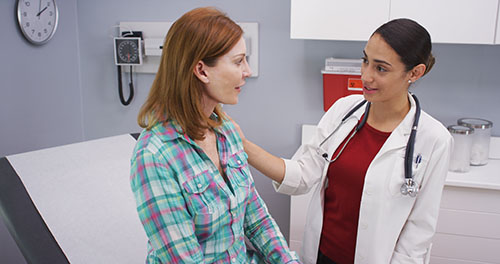
Cervical cancer was once one of the most common causes of cancer deaths among American women and people assigned female at birth, but that has since taken a turn for the better. Here are the top four things you should know about cervical cancer and how to lower your risk:
1. An increase in screening is one reason fewer people are dying from cervical cancer.
Females should receive one or both of the recommended routine cervical cancer screenings: the Papanicolaou (Pap) test also known as a Pap smear, and the human papillomavirus (HPV) test
The American Cancer Society recommends these routine screenings for adults with a cervix who are between the ages of 21 and 65. Your obstetrician and gynecologist (OBGYN) will suggest the proper testing and how often you should be screened based on your health history, age and habits.
2. Precancerous lesions can be found before cancer develops.
Early detection can make a world of difference in preventing the disease. Finding precancerous lesions in or around the cervix during a Pap test allows the specialist to provide the care needed to prevent the cells from developing into cancer.
3. HPV is the leading cause of cervical cancer, but there is a vaccine to prevent contracting the virus.
HPV is a group of over 150 related viruses and is the most common sexually transmitted infection globally. Around 20 to 40 of those subtypes can cause cancer, including cervical cancer. Nearly every person who is sexually active will get HPV at some point in their life unless they are vaccinated. With this knowledge, cervical cancer screenings are encouraged.
Cervical cancer is one of a handful of cancers that can be prevented by vaccination. The Centers for Disease Control and Prevention estimates that the HPV vaccine can help reduce the number of cancer cases caused by HPV by 90% each year. The vaccine protects against the most common high-risk variants in the U.S. and not only reduces the risk of cervical cancer but reduces the risk of some head and neck cancers as well. Vaccination is recommended for children ages 9-12 to help prevent cervical cancer as an adult. However, the HPV vaccine is an option for teens and young adults through age 45.
4. Quitting smoking or never smoking reduces the risk of cervical cancer.
One of the easiest ways to minimize the risk, in addition to screening and vaccination, is to stop or never begin smoking. There are at least 70 known causes of cancer within the chemicals used in cigarettes, not to mention all other health issues that can arise from smoking. There are also cancer-causing chemicals used in cigars, smokeless tobacco and e-cigarettes. Visit karmanos.org/quitsmoking for resources to help you quit. Some McLaren facilities offer smoking cessation programs, as well.
Schedule your cervical cancer screening today.
Discuss your cervical cancer screening options with your OGBYN. If you need an OBYGN, click here to search for a McLaren specialist currently accepting new patients.
If you or a loved one has been diagnosed with cervical cancer, or if you need a second opinion, schedule a consultation with the experts at Karmanos. It is important to be evaluated by cancer experts before beginning treatment.
Visit the Cervical Cancer Facts and Prevention page to learn more.
Karmanos Locations
Find a Karmanos Cancer Institute near you.
Click here